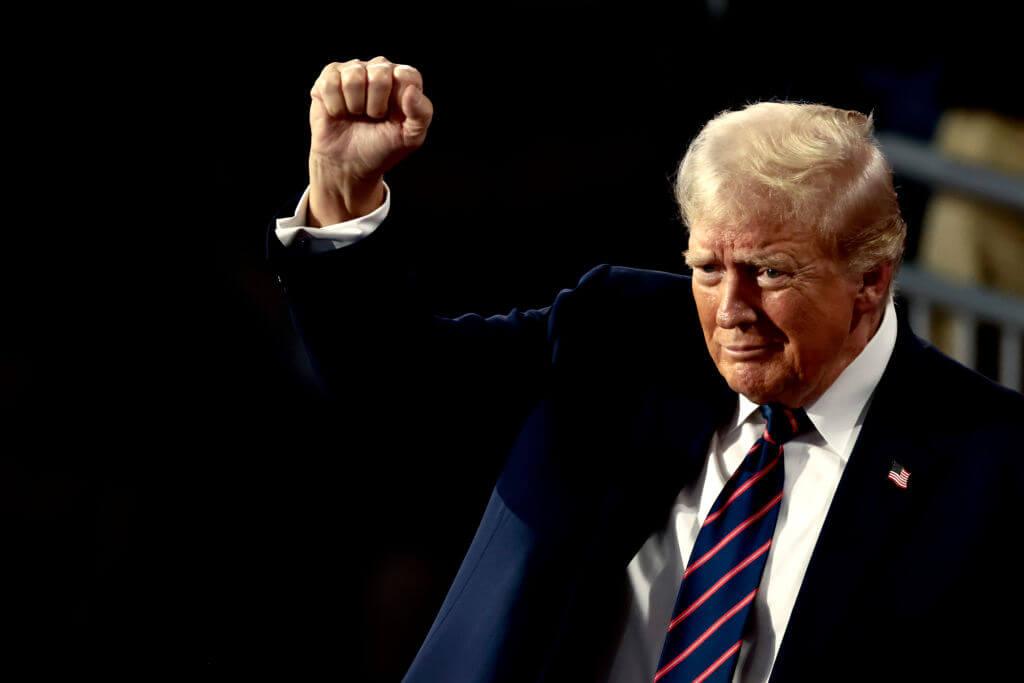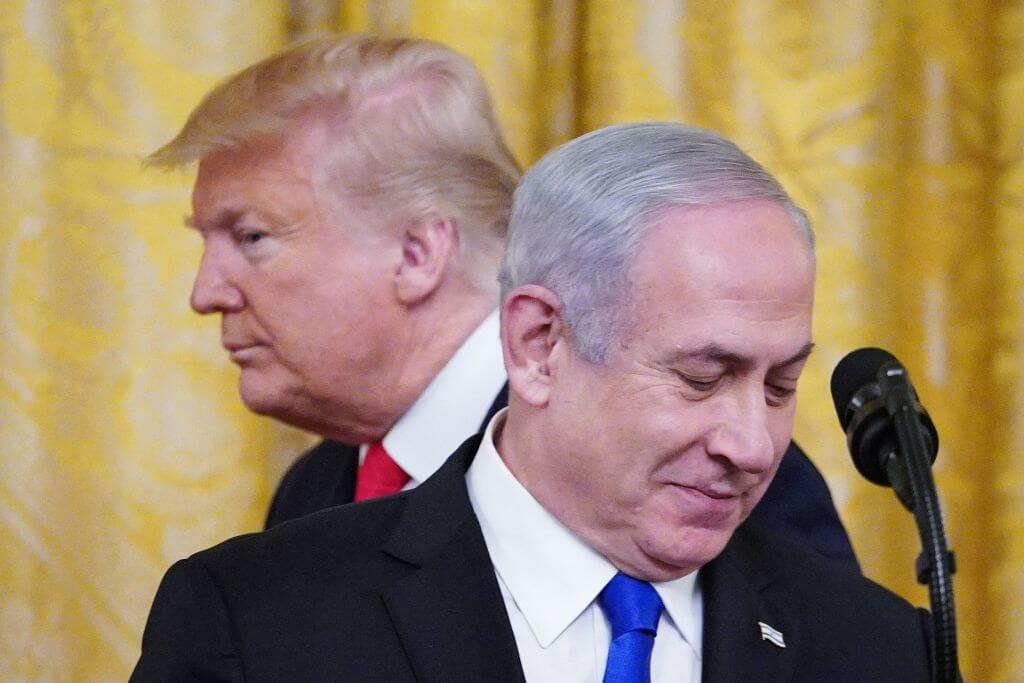Analysis: What a second Trump presidency could mean for Jews and Israel
Donald Trump hasn’t said much about what he would do in a second term about issues of particular interest to Jewish Americans — but there are clues

Former President Donald Trump at the Republican National Convention (RNC) on July 17, 2024. Photo by Hannah Beier/Bloomberg via Getty Images
Jacob Kornbluh, the Forward’s senior political reporter, is in Milwaukee this week covering the Republican National Convention. He will also be reporting from the Democratic National Convention in Chicago next month.
MILWAUKEE — Donald Trump, who will accept the Republican National Convention’s presidential nomination Thursday night, hasn’t said much about what he would do in a second term about issues of particular interest to Jewish Americans.
The RNC’s 2024 platform isn’t much help. It talks mostly in generalities, about how Republicans will “stand with Israel” and seek peace in the Middle East. It also promises to “deport pro-Hamas radicals and make our college campuses safe and patriotic again.”
Making the case for Trump, Jews at the convention point to his Mideast record as president: the relocation of the American embassy from Tel Aviv to Jerusalem, the recognition of Israel’s control over the Golan Heights, the withdrawal of the Iran nuclear deal and the brokering of the Abraham Accords.
So while it’s clear that Trump gave pro-Israel voters much of what they wanted in the past, it’s harder to predict how he might deal with Israel, its conflict with Palestinians, and rising antisemitism if he wins a second term. But there are clues.
What would a second Trump presidency mean for Israel?

American Jews vote overwhelmingly for Democrats. But Trump’s Jewish allies say he has “fought for Israel like no president ever before.” Since he left office in 2021 and following the Oct. 7 attack, however, Trump has offered less than full-throated support for Israel, the hostages taken by Hamas or Israeli Prime Minister Benjamin Netanyahu.
He has remarked that Hamas would never have attacked Israel had he been in the Oval Office and criticized Netanyahu’s handling of the war in Gaza, which he said shifted U.S. public opinion against Israel.
Trump has also called for a swift end to the war and said Netanyahu should pay a price for the security failures leading up to the Hamas attacks.
At the same time, Trump has promised major donors to back Israel’s war on terror — and he’s called for retribution against pro-Palestinian campus protesters.
If Israel is still fighting Hamas in Gaza in a second Trump term, Trump would likely try to end the conflict with the help of Mideast allies, some of the same partners he called on to broker the Abraham Accords.
Trump has pledged, however, to end a different war first: the conflict between Russia and Ukraine.
Many Mideast experts consider a peace deal with Palestinians a necessary part of a Saudi normalization deal with Israel. But former Jewish Rep. Lee Zeldin, a close ally of Trump team, said the former president doesn’t need to solve the Israeli-Palestinian conflict before he expands the Abraham Accords. “You don’t have to accept the premise that the only way in for the Middle East is through the front door,” the New Yorker said during a break at the convention. “If there’s a back door that is open, President Trump will find it.”
At the first presidential debate in June, Trump declined to say whether he favors the creation of an independent Palestinian state. “I’d have to see,” he said.
In a recent profile in New York magazine, Miriam Adelson, a major Trump backer, said she might want Trump to support Israel’s annexation of the occupied West Bank, which the Biden administration — and many Jewish Americans — oppose.
David Friedman, ambassador to Israel in the Trump administration, recently advocated for annexation. Following a Shabbat dinner at Mar-a-Lago with Adelson in March, Trump told Israel Hayom, an Israeli newspaper, that he plans to discuss an annexation strategy with Friedman.
J Street, which calls itself the “political home of pro-Israel, pro-peace, pro-democracy Americans,” warned of Trump’s plans for the Middle East. “A Trump victory means the Israeli right would have full White House backing for their wildest fantasies — a judicial coup, West Bank annexation, settlements in Gaza, endless violence, and military confrontations with both Hezbollah and Iran,” wrote J Street President Jeremy Ben-Ami.
Would Trump and Netanyahu repair their rift?

Trump soured on Netanyahu during his presidency. Recently, Netanyahu has signaled that he’s ready for a reset.
Earlier this week, the former president shared on his Truth Social platform a video of Netanyahu condemning Saturday’s assassination attempt. And Netanyahu’s allies have reportedly met with Trump at least four times in recent years to mend fences.
Detente between the two could affect military assistance for Israel.
Negotiations are set to begin next year ahead of the 2026 deadline for the 10-year Memorandum of Understanding between the nations. Trump, who views foreign aid as transactional, might refuse to consider an increase in the annual $3.8 billion in U.S. assistance. Friedman, the former ambassador, said Trump’s position remains unclear. Vice presidential nominee J.D. Vance, an isolationist, voted against an aid package this spring that included emergency assistance to Israel because, he said, it was coupled with aid to Ukraine.
Would a second-term Trump confront rising antisemitism?
Jewish delegates at the convention have expressed appreciation for the many non-Jews here who have shared their dismay over rising antisemitism. And GOP Jews have delighted in Trump’s tough talk about pro-Palestinian protesters, who rocked U.S. colleges this school year with calls for a ceasefire and the end of Zionism. Trump has promised to hold those protesters accountable, with legal action and deportation.
But he has not indicated whether or not he would embrace the Biden administration’s national plan to counter antisemitism, which government agencies are now implementing.
In Congress, Republicans have joined a group of Democrats to promote the Countering Antisemitism Act. It proposes the appointment of a new presidential adviser dedicated to antisemitism, separate from the State Department’s special envoy to monitor and combat antisemitism, a cabinet-level position focused overseas and now held by Deborah Lipstadt. A similar bipartisan bill mandates the Department of Education use the controversial International Holocaust Remembrance Alliance definition of antisemitism, which classifies much anti-Zionism as antisemitic.
In 2022, Trump drew the ire of American Jews when he dined with Holocaust denier Nick Fuentes. And since he launched his presidential bid last year, Trump has accused American Jews of disloyalty to Israel, and said repeatedly that “any Jewish person that votes for Democrats hates their religion.” Many Jews considered those comments antisemitic. But a pair of recent polls show a small slip of Jewish voters toward Trump compared to previous years.















